高考复习之情态动词[上下学期通用]
图片预览
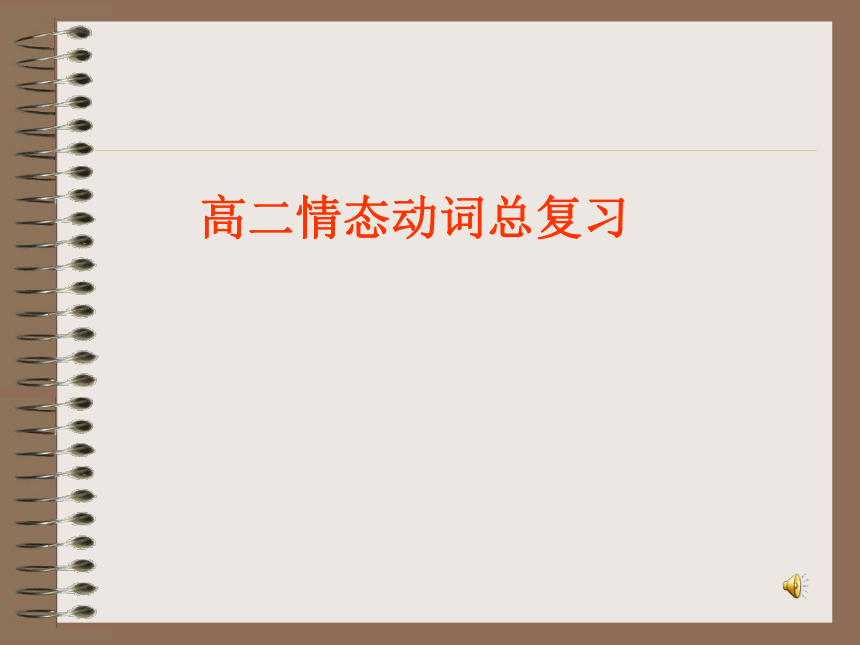
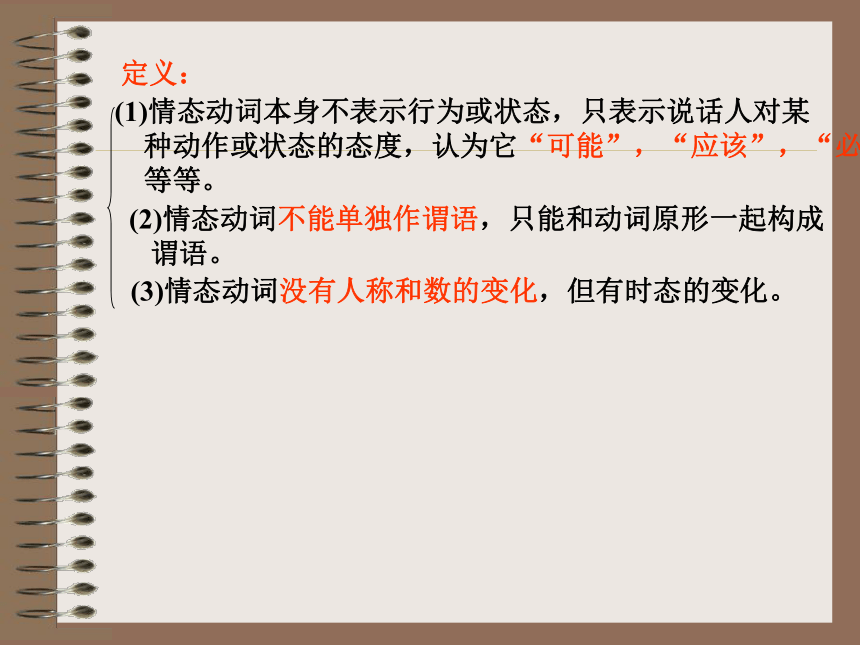
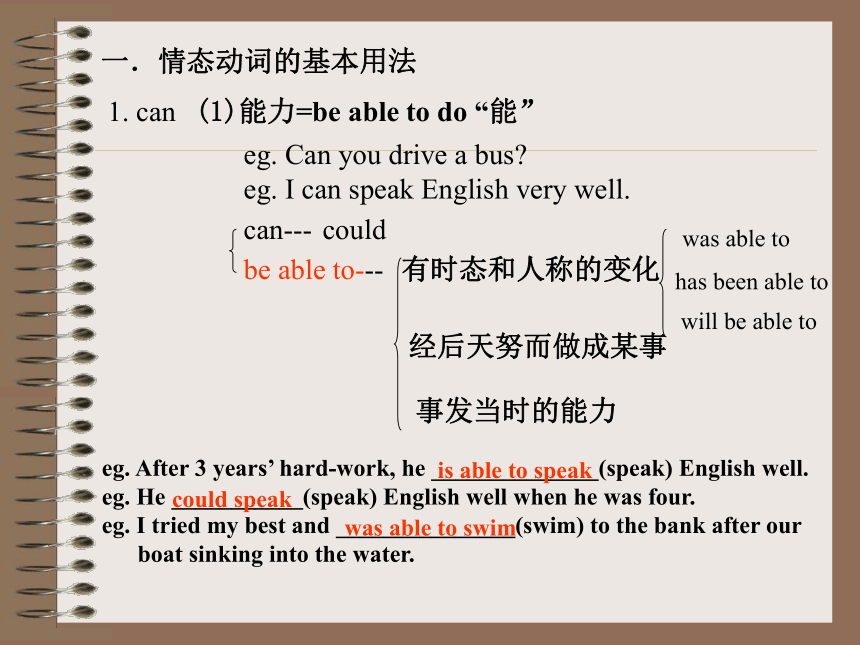
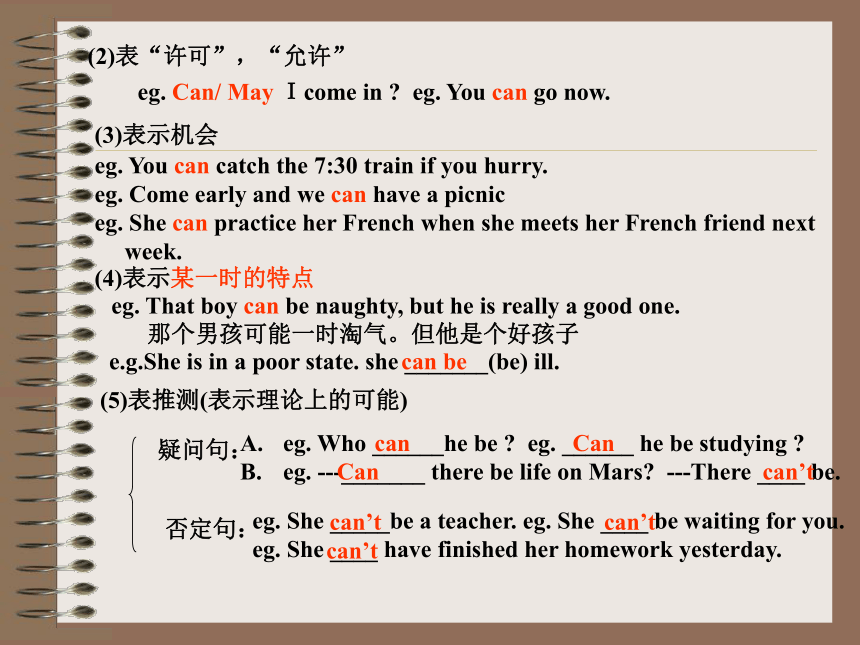
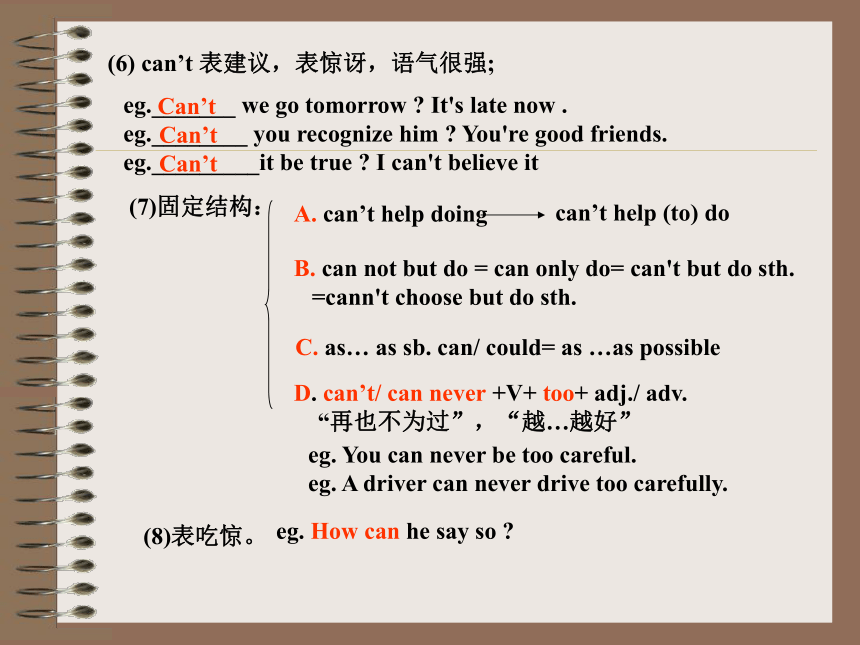
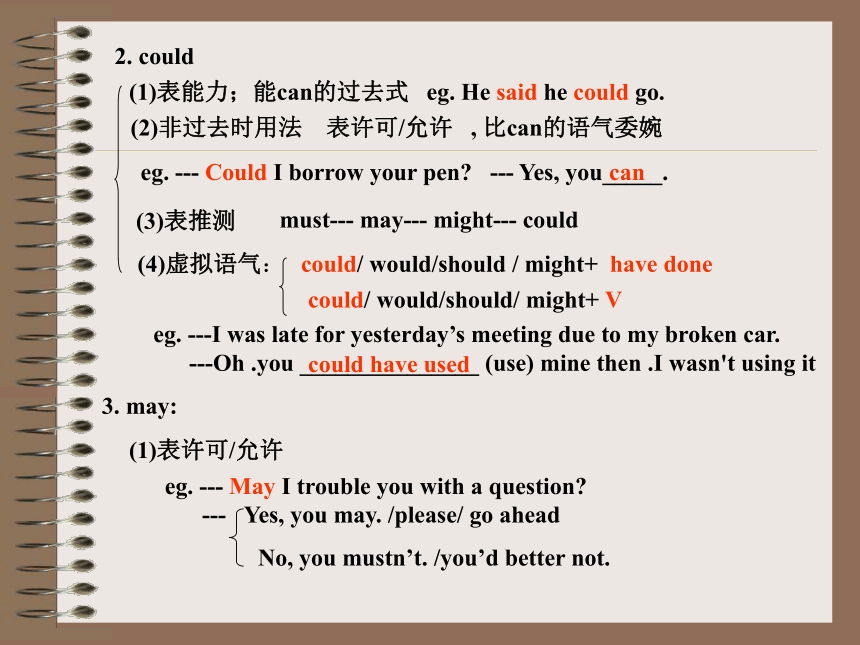
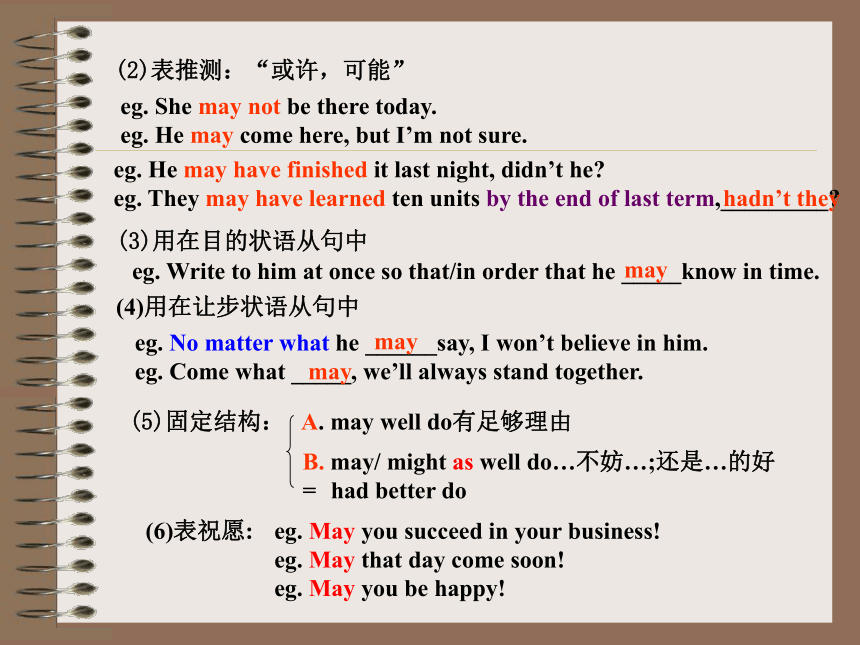
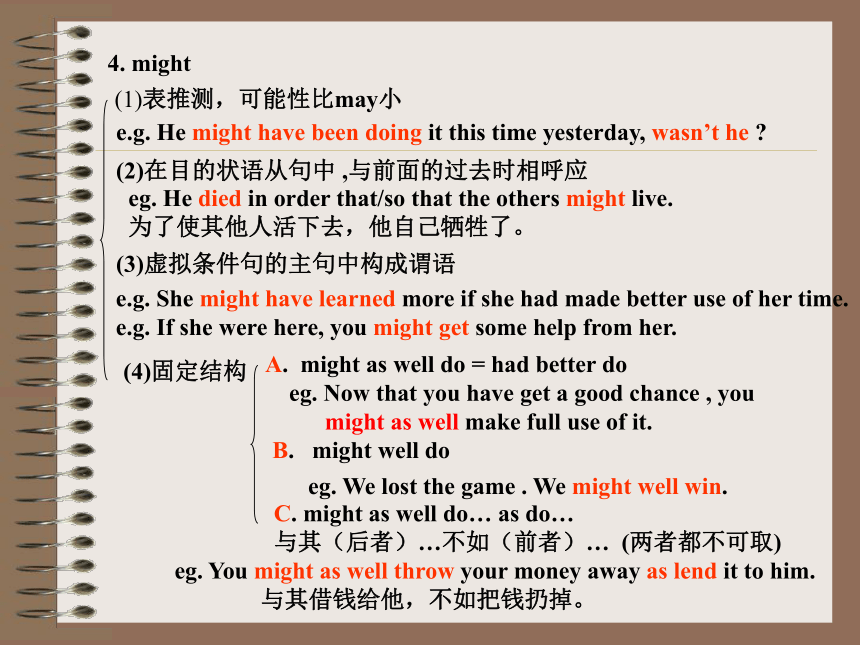
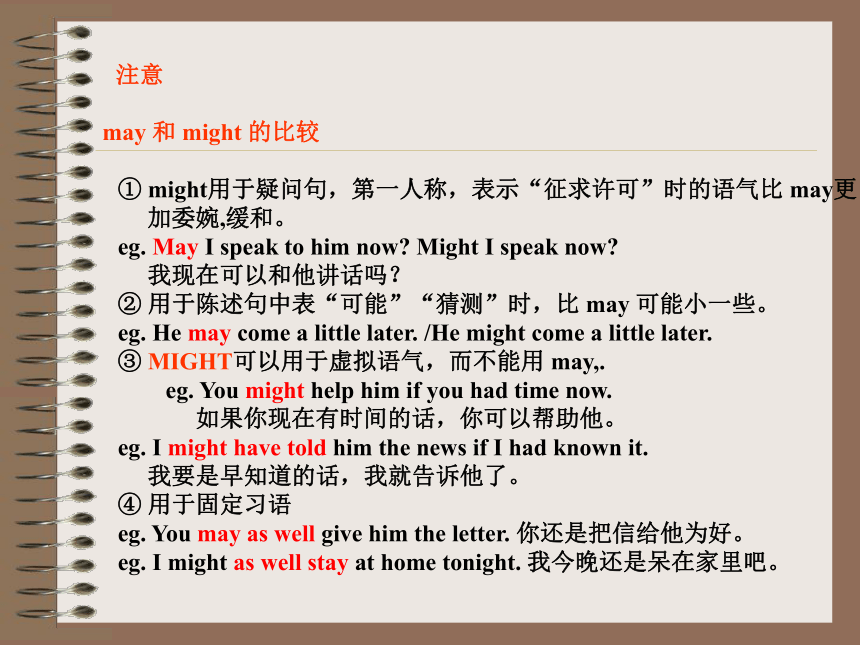
文档简介
课件23张PPT。高二情态动词总复习定义: (1)情态动词本身不表示行为或状态,只表示说话人对某
种动作或状态的态度,认为它“可能”,“应该”,“必要”
等等。 (2)情态动词不能单独作谓语,只能和动词原形一起构成
谓语。(3)情态动词没有人称和数的变化,但有时态的变化。一.情态动词的基本用法 1. can (1)能力=be able to do “能” eg. Can you drive a bus?
eg. I can speak English very well. can--- couldbe able to--- 有时态和人称的变化 was able to has been able to will be able to 经后天努而做成某事事发当时的能力eg. After 3 years’ hard-work, he ______________(speak) English well.
eg. He ___________(speak) English well when he was four.
eg. I tried my best and _______________(swim) to the bank after our
boat sinking into the water.is able to speakcould speakwas able to swim(2)表“许可”,“允许” eg. Can/ May Icome in ? eg. You can go now. (3)表示机会 eg. You can catch the 7:30 train if you hurry.
eg. Come early and we can have a picnic
eg. She can practice her French when she meets her French friend next
week.
(4)表示某一时的特点 eg. That boy can be naughty, but he is really a good one.
那个男孩可能一时淘气。但他是个好孩子e.g.She is in a poor state. she _______(be) ill.can be(5)表推测(表示理论上的可能) 疑问句: 否定句: eg. Who ______he be ? eg. ______ he be studying ?
eg. ---_______ there be life on Mars? ---There ____ be.canCanCancan’teg. She _____be a teacher. eg. She ____ be waiting for you.
eg. She ____ have finished her homework yesterday.can’tcan’tcan’t(6) can’t 表建议,表惊讶,语气很强;eg._______ we go tomorrow ? It's late now .
eg.________ you recognize him ? You're good friends.
eg._________it be true ? I can't believe itCan’tCan’tCan’t(7)固定结构: A. can’t help doing can’t help (to) do B. can not but do = can only do= can't but do sth.
=cann't choose but do sth. C. as… as sb. can/ could= as …as possible D. can’t/ can never +V+ too+ adj./ adv.
“再也不为过”,“越…越好”
eg. You can never be too careful.
eg. A driver can never drive too carefully.(8)表吃惊。eg. How can he say so ?2. could (1)表能力;能can的过去式 eg. He said he could go.(2)非过去时用法 表许可/允许 , 比can的语气委婉eg. --- Could I borrow your pen? --- Yes, you_____. can(3)表推测must--- may--- might--- could(4)虚拟语气: could/ would/should / might+ have done could/ would/should/ might+ Veg. ---I was late for yesterday’s meeting due to my broken car.
---Oh .you _______________ (use) mine then .I wasn't using itcould have used3. may: (1)表许可/允许 eg. --- May I trouble you with a question? --- Yes, you may. /please/ go ahead No, you mustn’t. /you’d better not. (2)表推测:“或许,可能” eg. She may not be there today.
eg. He may come here, but I’m not sure.eg. He may have finished it last night, didn’t he?
eg. They may have learned ten units by the end of last term,_________?hadn’t they(3)用在目的状语从句中 eg. Write to him at once so that/in order that he _____know in time.may(4)用在让步状语从句中 eg. No matter what he ______say, I won’t believe in him.
eg. Come what _____, we’ll always stand together.maymay(5)固定结构: A. may well do有足够理由
B. may/ might as well do…不妨…;还是…的好
=had better do
(6)表祝愿: eg. May you succeed in your business!
eg. May that day come soon!
eg. May you be happy!4. might (1)表推测,可能性比may小 e.g. He might have been doing it this time yesterday, wasn’t he ? (2)在目的状语从句中 ,与前面的过去时相呼应eg. He died in order that/so that the others might live.
为了使其他人活下去,他自己牺牲了。
(3)虚拟条件句的主句中构成谓语 e.g. She might have learned more if she had made better use of her time.
e.g. If she were here, you might get some help from her.(4)固定结构 A. might as well do = had better do
eg. Now that you have get a good chance , you
might as well make full use of it.B. might well do eg. We lost the game . We might well win. C. might as well do… as do…
与其(后者)…不如(前者)… (两者都不可取)
eg. You might as well throw your money away as lend it to him.
与其借钱给他,不如把钱扔掉。
注意may 和 might 的比较① might用于疑问句,第一人称,表示“征求许可”时的语气比 may更
加委婉,缓和。
eg. May I speak to him now? Might I speak now?
我现在可以和他讲话吗?
② 用于陈述句中表“可能”“猜测”时,比 may 可能小一些。
eg. He may come a little later. /He might come a little later.
③ MIGHT可以用于虚拟语气,而不能用 may,.
eg. You might help him if you had time now.
如果你现在有时间的话,你可以帮助他。
eg. I might have told him the news if I had known it.
我要是早知道的话,我就告诉他了。
④ 用于固定习语
eg. You may as well give him the letter. 你还是把信给他为好。
eg. I might as well stay at home tonight. 我今晚还是呆在家里吧。
5. must : (1) 肯定句:必须 否定句:一定不准,禁止 eg. You mustn’t smoke here.
eg. I mustn’t do it, mustn’t I? 疑问: --- Must I go home?
--- Yes, you must. (注意简略回答)
No, you needn’t/ don’t have to/ haven’t got to.
Note:must : 主观看法 eg. I must go now. (I have sth. to do .) have to:客观需要 eg. I have to go now.(It’s too late.) 有时态,人称的变化must : 只表示现在
have to :有各种时态(3) must:可表推断
have to: 不可表推断(4) 询问对方表意愿时应用muste.g. Must I go home?(5) 两者的否定意义大不相同mustn’t 表示禁止,是说话人强有力的劝告,意为“决不可以,
不准,不允许”
don’t have to: “不必”e.g. You mustn’t go there.你决不可以去那儿。
e.g. You don’t have to go there.你不必去。eg. There must be some mistake,__________?
eg. He must be studying now,_______?
eg. It must have rained last night ,________?
eg. He must have finished the work,________?
eg. They must have learned 3 units by the end of last term,_________?
eg. He must be studying at this time last night,_________?
eg. He must be playing now,_______?isn’t thereisn’t hedidn’t ithasn’t hehadn’t theywasn’t heisn’t he(3)偏要。(指令人不快的事)eg. The car ______break down when they were about to start off.must6. shall : (1) 第一,第三人称表征求意见,请求命令。eg. ______I turn on the radio?
eg. When _____he leave the hospital?Shallshall(2)第二,第三人称表命令,警告,威胁,许诺。 eg. You shall have my answer to morrow.(3)表按规定制度必须做eg.As a school rule. a student _______protect school environment.shall(2)表推测:“一定”(肯定句) 7. should (1) 表劝告,建议 “应当” ought to / should 表义务,责任。
eg. You should brush your teeth every day.(2)表预测的可能性,按常规/习惯性eg. It’s Sunday afternoon . He ______be at home.
eg. The film ______be developed at this time tomorrow.shouldshould(3)虚拟语气 A. I DROP CAPS.的宾语从句里。从句谓语动词为(should) doB. 用在名词suggestion/ insistence/ order/ proposal/ demand
(要求)等后的名词性从句中,从句谓语动词为(should) doC. 用在: It +be + natural , strange, important, necessary,
impossible , surprising,/ a pity,a shame ,no wonder,
an honor,/suggested, ordered, insisted ,required等 )
that-… (should )+ 动词原形 (主语从句)
从句谓语动词为(should) doD. should have done
shouldn’t have doneI----------insist :坚持
D---------demand :要求 desire:要求;请求
R---------request :请求 request:需要;要求
O---------order:命令
P---------propose:建议
C---------command:命令
A---------advise:建议
P---------prefer:宁愿
S---------suggest:建议e.g. I suggested that he (should) finish the work at once.
e.g. His pale face suggested that he was ill.e.g. I insisted that he (should) finish the work at once.
e.g. I insisted that I was right.eg. Tom , you _________________(spend)more time in English study.
eg. Tom, you ________________ (spend)so much time playing computer
games.
eg. You _________________(keep)him waiting so long.should have spentshouldn’t have spentshouldn’t have keptE. 用在lest/ in case / for fear that引导的状语从句中。“以免,以防”
从句中用should +V.eg. He took his raincoat in case it _______rain.(不能用will/ would)
eg. Put on your hat in case you _______get burnt.shouldshould8. will: (1) 意愿,意志,愿意 eg. If you will wait over there for a moment, the manager will be here
soon. (2)临时决定。 eg. --- You have left the light on.
--- Oh, so I have. _______ and turn it off. A. I’ll go B. I’m going. I’ll go(此时不能用I’m going to do it/ I’m to do it.)(3)表倾向性/习惯性的动作 eg. Fish will die out of water.
eg. The door won’t lock..(4)疑问句中表邀请 eg. Will you go with me?9. would: (1) 表过去时的意愿,意志,愿意 eg. I told him that I ______(will)go along with him.would(2)表过去的倾向性/习惯性的动作 eg. He told me the door wouldn’t open.eg. When he was a child , he would play football.(区别与used to do)would 过去 used to do :今昔对照 (3) would 比will的语气更加委婉。---肯定回答用willeg. --- Would you help me? --- Yes, I______.will.(4)虚拟语气。 (5)固定结构: would like sth (to be done)
would like sb. to do sthwould rather do than do…
would do rather than do…would rather have done宁愿当时做过…事
would rather not have done…宁愿当时没做过…事eg. ---Did you scold him for careless?
--- Yes, but I would rather not have done it.10. need: (1)情态V A: 否/疑 eg. --- Need I come ?
--- Yes, you must.No, you needn’t / don’t have to
/haven’t got to..eg. we needn’t do it.B. needn’t have done 不必做而做了/没有必要做却做了eg. You needn’t have told him about it .(2) 实意V A. 有人称数和时态的变化
B. 借助于助动词构成疑问和否定
don’t need to do
Does he need to know it?
C. 后接to do…
D. 实意动词+ doing/ to be done (want/ require)eg. You needn’t go there at once.= You don’t _____________________
eg. Need he go there at once? = Does he _______________________need to go there at once.need to go there at once?11. dare: (1) 情态V A. 否/疑 eg. I dare not go out alone at night.
= I don’t _________________________.
eg. Dare you go home alone?dare to go out alone at night.B. 没有人称和数的变化,有过去时式dared(2) 实意V A. 有人称数和时态的变化
B. 借助于助动词构成疑问和否定
don’t dare to do
Does he dare to come alone?
C. 后接to do…(3) I dare say.我敢说/我认为(固定结构)
(否则肯定句只能采取实意动词形式) eg. Dare you go with me?= Do you dare _______________?to go with meNote: dare用作实意动词时,在否定句,疑问句,条件句及由how
引出的宾语从句中to可省去,但以现在分词出现时to不可省。
e.g. He doesn’t dare (to) go there.
他不敢去那儿。
e.g. He never dares (to) do that.
他从不敢做那事儿。
e.g. Don’t you dare (to) touch it?
难道你不敢碰它?
e.g. I wander how he dared (to) say that.
我奇怪他怎么敢说出那事。
e.g. He stood there, not daring to look at me.
他站在那儿,不敢看我。Need/ dare 都可用作情态动词和实意动词。 做情态动词的共同用法是: (1)无人称和数的变化
(2) 不单独用,后接动词原形
(3) 用本身构成疑问;直接加not构成否定
(4)不用于肯定句 做实意动词的共同用法是: (1)有人称和数的变化
(2)后接to do 的形式
(3) 借助于助动词构成否定和疑问eg. I need to go there at once.
eg. I dare to speak in public.12. used to do “过去常常”(1)肯定句 eg. I used to go to bed at ten o’clock.(2)否定句 eg. I didn’t use to go to the cinema.
= I usedn’t to go to the cinema.(3)疑问句 eg. ---Did you use to swim in the river ?
= Used you to swim in the river ? --- Yes, I did /________..I used to(4)反意疑问句。Eg. He used to be very fat,________________?didn’t/ use(d)n’t he二.情态动词的完成式1.must have done: “一定”(对过去的猜测)eg. It must have rained last night , for the ground is very wet. 2.may/ might have done “或许”(对过去的测)eg. He may/might have passed the exam, but I’m not sure.3. may/ might not have done “或许没”(对过去的猜测) eg, He may not have been injured in the accident.(5)强调句e.g. I certainly used to smoke , but it was a long time ago.
e.g. I certainly did use to smoke , but it… .4.can’t/ couldn’t have done “不可能”(对过去的猜测) eg. I saw him just now. He can’t have gone to Beijing.5. should/ ought to have done “本应该做而未做”eg. I should have studied hard. How I regret I wasted a lot of time!6. shouldn’t have done= oughtn’t to have done“本不应该” eg. You shouldn’t have lent money to him. 7. need have done/ needn’t have done eg. Its’ going to rain. You needn’t watered the flowers. 8. could have done “本可以”eg. You didn’t need to stay at a hotel. You could have stayed with me.Thank you!
种动作或状态的态度,认为它“可能”,“应该”,“必要”
等等。 (2)情态动词不能单独作谓语,只能和动词原形一起构成
谓语。(3)情态动词没有人称和数的变化,但有时态的变化。一.情态动词的基本用法 1. can (1)能力=be able to do “能” eg. Can you drive a bus?
eg. I can speak English very well. can--- couldbe able to--- 有时态和人称的变化 was able to has been able to will be able to 经后天努而做成某事事发当时的能力eg. After 3 years’ hard-work, he ______________(speak) English well.
eg. He ___________(speak) English well when he was four.
eg. I tried my best and _______________(swim) to the bank after our
boat sinking into the water.is able to speakcould speakwas able to swim(2)表“许可”,“允许” eg. Can/ May Icome in ? eg. You can go now. (3)表示机会 eg. You can catch the 7:30 train if you hurry.
eg. Come early and we can have a picnic
eg. She can practice her French when she meets her French friend next
week.
(4)表示某一时的特点 eg. That boy can be naughty, but he is really a good one.
那个男孩可能一时淘气。但他是个好孩子e.g.She is in a poor state. she _______(be) ill.can be(5)表推测(表示理论上的可能) 疑问句: 否定句: eg. Who ______he be ? eg. ______ he be studying ?
eg. ---_______ there be life on Mars? ---There ____ be.canCanCancan’teg. She _____be a teacher. eg. She ____ be waiting for you.
eg. She ____ have finished her homework yesterday.can’tcan’tcan’t(6) can’t 表建议,表惊讶,语气很强;eg._______ we go tomorrow ? It's late now .
eg.________ you recognize him ? You're good friends.
eg._________it be true ? I can't believe itCan’tCan’tCan’t(7)固定结构: A. can’t help doing can’t help (to) do B. can not but do = can only do= can't but do sth.
=cann't choose but do sth. C. as… as sb. can/ could= as …as possible D. can’t/ can never +V+ too+ adj./ adv.
“再也不为过”,“越…越好”
eg. You can never be too careful.
eg. A driver can never drive too carefully.(8)表吃惊。eg. How can he say so ?2. could (1)表能力;能can的过去式 eg. He said he could go.(2)非过去时用法 表许可/允许 , 比can的语气委婉eg. --- Could I borrow your pen? --- Yes, you_____. can(3)表推测must--- may--- might--- could(4)虚拟语气: could/ would/should / might+ have done could/ would/should/ might+ Veg. ---I was late for yesterday’s meeting due to my broken car.
---Oh .you _______________ (use) mine then .I wasn't using itcould have used3. may: (1)表许可/允许 eg. --- May I trouble you with a question? --- Yes, you may. /please/ go ahead No, you mustn’t. /you’d better not. (2)表推测:“或许,可能” eg. She may not be there today.
eg. He may come here, but I’m not sure.eg. He may have finished it last night, didn’t he?
eg. They may have learned ten units by the end of last term,_________?hadn’t they(3)用在目的状语从句中 eg. Write to him at once so that/in order that he _____know in time.may(4)用在让步状语从句中 eg. No matter what he ______say, I won’t believe in him.
eg. Come what _____, we’ll always stand together.maymay(5)固定结构: A. may well do有足够理由
B. may/ might as well do…不妨…;还是…的好
=had better do
(6)表祝愿: eg. May you succeed in your business!
eg. May that day come soon!
eg. May you be happy!4. might (1)表推测,可能性比may小 e.g. He might have been doing it this time yesterday, wasn’t he ? (2)在目的状语从句中 ,与前面的过去时相呼应eg. He died in order that/so that the others might live.
为了使其他人活下去,他自己牺牲了。
(3)虚拟条件句的主句中构成谓语 e.g. She might have learned more if she had made better use of her time.
e.g. If she were here, you might get some help from her.(4)固定结构 A. might as well do = had better do
eg. Now that you have get a good chance , you
might as well make full use of it.B. might well do eg. We lost the game . We might well win. C. might as well do… as do…
与其(后者)…不如(前者)… (两者都不可取)
eg. You might as well throw your money away as lend it to him.
与其借钱给他,不如把钱扔掉。
注意may 和 might 的比较① might用于疑问句,第一人称,表示“征求许可”时的语气比 may更
加委婉,缓和。
eg. May I speak to him now? Might I speak now?
我现在可以和他讲话吗?
② 用于陈述句中表“可能”“猜测”时,比 may 可能小一些。
eg. He may come a little later. /He might come a little later.
③ MIGHT可以用于虚拟语气,而不能用 may,.
eg. You might help him if you had time now.
如果你现在有时间的话,你可以帮助他。
eg. I might have told him the news if I had known it.
我要是早知道的话,我就告诉他了。
④ 用于固定习语
eg. You may as well give him the letter. 你还是把信给他为好。
eg. I might as well stay at home tonight. 我今晚还是呆在家里吧。
5. must : (1) 肯定句:必须 否定句:一定不准,禁止 eg. You mustn’t smoke here.
eg. I mustn’t do it, mustn’t I? 疑问: --- Must I go home?
--- Yes, you must. (注意简略回答)
No, you needn’t/ don’t have to/ haven’t got to.
Note:must : 主观看法 eg. I must go now. (I have sth. to do .) have to:客观需要 eg. I have to go now.(It’s too late.) 有时态,人称的变化must : 只表示现在
have to :有各种时态(3) must:可表推断
have to: 不可表推断(4) 询问对方表意愿时应用muste.g. Must I go home?(5) 两者的否定意义大不相同mustn’t 表示禁止,是说话人强有力的劝告,意为“决不可以,
不准,不允许”
don’t have to: “不必”e.g. You mustn’t go there.你决不可以去那儿。
e.g. You don’t have to go there.你不必去。eg. There must be some mistake,__________?
eg. He must be studying now,_______?
eg. It must have rained last night ,________?
eg. He must have finished the work,________?
eg. They must have learned 3 units by the end of last term,_________?
eg. He must be studying at this time last night,_________?
eg. He must be playing now,_______?isn’t thereisn’t hedidn’t ithasn’t hehadn’t theywasn’t heisn’t he(3)偏要。(指令人不快的事)eg. The car ______break down when they were about to start off.must6. shall : (1) 第一,第三人称表征求意见,请求命令。eg. ______I turn on the radio?
eg. When _____he leave the hospital?Shallshall(2)第二,第三人称表命令,警告,威胁,许诺。 eg. You shall have my answer to morrow.(3)表按规定制度必须做eg.As a school rule. a student _______protect school environment.shall(2)表推测:“一定”(肯定句) 7. should (1) 表劝告,建议 “应当” ought to / should 表义务,责任。
eg. You should brush your teeth every day.(2)表预测的可能性,按常规/习惯性eg. It’s Sunday afternoon . He ______be at home.
eg. The film ______be developed at this time tomorrow.shouldshould(3)虚拟语气 A. I DROP CAPS.的宾语从句里。从句谓语动词为(should) doB. 用在名词suggestion/ insistence/ order/ proposal/ demand
(要求)等后的名词性从句中,从句谓语动词为(should) doC. 用在: It +be + natural , strange, important, necessary,
impossible , surprising,/ a pity,a shame ,no wonder,
an honor,/suggested, ordered, insisted ,required等 )
that-… (should )+ 动词原形 (主语从句)
从句谓语动词为(should) doD. should have done
shouldn’t have doneI----------insist :坚持
D---------demand :要求 desire:要求;请求
R---------request :请求 request:需要;要求
O---------order:命令
P---------propose:建议
C---------command:命令
A---------advise:建议
P---------prefer:宁愿
S---------suggest:建议e.g. I suggested that he (should) finish the work at once.
e.g. His pale face suggested that he was ill.e.g. I insisted that he (should) finish the work at once.
e.g. I insisted that I was right.eg. Tom , you _________________(spend)more time in English study.
eg. Tom, you ________________ (spend)so much time playing computer
games.
eg. You _________________(keep)him waiting so long.should have spentshouldn’t have spentshouldn’t have keptE. 用在lest/ in case / for fear that引导的状语从句中。“以免,以防”
从句中用should +V.eg. He took his raincoat in case it _______rain.(不能用will/ would)
eg. Put on your hat in case you _______get burnt.shouldshould8. will: (1) 意愿,意志,愿意 eg. If you will wait over there for a moment, the manager will be here
soon. (2)临时决定。 eg. --- You have left the light on.
--- Oh, so I have. _______ and turn it off. A. I’ll go B. I’m going. I’ll go(此时不能用I’m going to do it/ I’m to do it.)(3)表倾向性/习惯性的动作 eg. Fish will die out of water.
eg. The door won’t lock..(4)疑问句中表邀请 eg. Will you go with me?9. would: (1) 表过去时的意愿,意志,愿意 eg. I told him that I ______(will)go along with him.would(2)表过去的倾向性/习惯性的动作 eg. He told me the door wouldn’t open.eg. When he was a child , he would play football.(区别与used to do)would 过去 used to do :今昔对照 (3) would 比will的语气更加委婉。---肯定回答用willeg. --- Would you help me? --- Yes, I______.will.(4)虚拟语气。 (5)固定结构: would like sth (to be done)
would like sb. to do sthwould rather do than do…
would do rather than do…would rather have done宁愿当时做过…事
would rather not have done…宁愿当时没做过…事eg. ---Did you scold him for careless?
--- Yes, but I would rather not have done it.10. need: (1)情态V A: 否/疑 eg. --- Need I come ?
--- Yes, you must.No, you needn’t / don’t have to
/haven’t got to..eg. we needn’t do it.B. needn’t have done 不必做而做了/没有必要做却做了eg. You needn’t have told him about it .(2) 实意V A. 有人称数和时态的变化
B. 借助于助动词构成疑问和否定
don’t need to do
Does he need to know it?
C. 后接to do…
D. 实意动词+ doing/ to be done (want/ require)eg. You needn’t go there at once.= You don’t _____________________
eg. Need he go there at once? = Does he _______________________need to go there at once.need to go there at once?11. dare: (1) 情态V A. 否/疑 eg. I dare not go out alone at night.
= I don’t _________________________.
eg. Dare you go home alone?dare to go out alone at night.B. 没有人称和数的变化,有过去时式dared(2) 实意V A. 有人称数和时态的变化
B. 借助于助动词构成疑问和否定
don’t dare to do
Does he dare to come alone?
C. 后接to do…(3) I dare say.我敢说/我认为(固定结构)
(否则肯定句只能采取实意动词形式) eg. Dare you go with me?= Do you dare _______________?to go with meNote: dare用作实意动词时,在否定句,疑问句,条件句及由how
引出的宾语从句中to可省去,但以现在分词出现时to不可省。
e.g. He doesn’t dare (to) go there.
他不敢去那儿。
e.g. He never dares (to) do that.
他从不敢做那事儿。
e.g. Don’t you dare (to) touch it?
难道你不敢碰它?
e.g. I wander how he dared (to) say that.
我奇怪他怎么敢说出那事。
e.g. He stood there, not daring to look at me.
他站在那儿,不敢看我。Need/ dare 都可用作情态动词和实意动词。 做情态动词的共同用法是: (1)无人称和数的变化
(2) 不单独用,后接动词原形
(3) 用本身构成疑问;直接加not构成否定
(4)不用于肯定句 做实意动词的共同用法是: (1)有人称和数的变化
(2)后接to do 的形式
(3) 借助于助动词构成否定和疑问eg. I need to go there at once.
eg. I dare to speak in public.12. used to do “过去常常”(1)肯定句 eg. I used to go to bed at ten o’clock.(2)否定句 eg. I didn’t use to go to the cinema.
= I usedn’t to go to the cinema.(3)疑问句 eg. ---Did you use to swim in the river ?
= Used you to swim in the river ? --- Yes, I did /________..I used to(4)反意疑问句。Eg. He used to be very fat,________________?didn’t/ use(d)n’t he二.情态动词的完成式1.must have done: “一定”(对过去的猜测)eg. It must have rained last night , for the ground is very wet. 2.may/ might have done “或许”(对过去的测)eg. He may/might have passed the exam, but I’m not sure.3. may/ might not have done “或许没”(对过去的猜测) eg, He may not have been injured in the accident.(5)强调句e.g. I certainly used to smoke , but it was a long time ago.
e.g. I certainly did use to smoke , but it… .4.can’t/ couldn’t have done “不可能”(对过去的猜测) eg. I saw him just now. He can’t have gone to Beijing.5. should/ ought to have done “本应该做而未做”eg. I should have studied hard. How I regret I wasted a lot of time!6. shouldn’t have done= oughtn’t to have done“本不应该” eg. You shouldn’t have lent money to him. 7. need have done/ needn’t have done eg. Its’ going to rain. You needn’t watered the flowers. 8. could have done “本可以”eg. You didn’t need to stay at a hotel. You could have stayed with me.Thank you!
